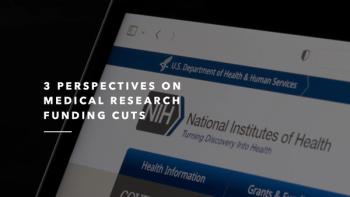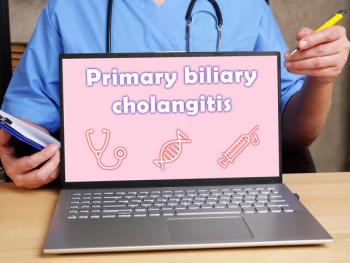
Improving access while maintaining a high level of research.

The global, randomized IDeate-Esophageal01 study will evaluate ifinatamab deruxtecan, a B7-H3–targeted antibody-drug conjugate, versus physician’s choice of chemotherapy in patients with advanced or metastatic esophageal squamous cell carcinoma following progression on platinum-based chemotherapy and immune checkpoint inhibitors.

In this video interview, Michael Liu, medical student and researcher at Harvard Medical School, discusses how these cuts are impacting critical areas of clinical research such as staffing and patient access.

Welireg (belzutifan), an oral HIF-2α inhibitor, demonstrated an objective response rate of 26% in the LITESPARK-015 study.

In this video interview, Michael Liu, medical student and researcher at Harvard Medical School, highlights key findings from a recent breakdown of funding cuts and how they are impacting research institutions.

In the Phase II LUMINOSITY study, Emrelis (telisotuzumab vedotin-tllv), a first-in-class c-Met-directed antibody-drug conjugate, demonstrated an overall response rate of 35%.

In this video interview, Michael Liu, medical student and researcher at Harvard Medical School, discusses a recent study he conducted on the characterization of research funding cuts.

Merck’s Phase III KEYNOTE-B96 trial shows significant overall and progression-free survival gains with Keytruda plus chemotherapy in patients with PD-L1–positive, platinum-resistant recurrent ovarian cancer, marking a breakthrough for immune checkpoint inhibitors in this hard-to-treat population.

Industry leaders share their thoughts on the NIH funding cuts and how they are impacting clinical research.

Decision follows underwhelming Phase II results from GALAXIES Lung-201 and H&N-202 trials, prompting iTeos and GSK to end development of the TIGIT-targeting antibody and halt enrollment in all ongoing belrestotug studies.

Tufts CSDD is conducting new research on trends in study monitoring and data collection.

The REAL8 basket study showed Sogroya (somapacitan) was non-inferior to Norditropin (somatropin) in improving yearly growth rate.

Final overall survival results from the Phase III APHINITY trial show a 17% reduction in the risk of death at 10 years for patients with HER2-positive early-stage breast cancer treated with a Perjeta-based adjuvant regimen.

In this video interview, Krinx Kong, chief commercial officer, Cognivia, discusses how clinical operations professionals should be focusing on flexibility, behavioral visibility, and communication in the current landscape of managing vaccine trials.

Overcoming hurdles with licensing complexities, post-production changes, and IRB submissions can help in reducing timelines and increasing collaboration.

In this video interview, Krinx Kong, chief commercial officer, Cognivia, highlights how patients’ perspectives on vaccine trials may shift if a policy change was to take place.

In the first head-to-head comparison of leading incretin-based therapies, Eli Lilly’s dual GIP/GLP-1 receptor agonist tirzepatide (Zepbound) delivered significantly greater and sustained weight loss than semaglutide (Wegovy) over 72 weeks in adults with obesity or overweight and comorbidities.

Updated GLISTEN trial results presented at EASL 2025 confirm that the IBAT inhibitor linerixibat significantly improved worst itch scores and itch-related sleep interference over 24 weeks in adults with primary biliary cholangitis.

In the POTOMAC study, one year of treatment with Imfinzi (durvalumab) plus standard-of-care BCG induction and maintenance therapy showed a meaningful improvement in disease-free survival.

In this video interview, Krinx Kong, chief commercial officer, Cognivia, talks patient recruitment and retention in vaccine studies as well as how behavioral, analytical tools can help patient support.

In this video interview, Krinx Kong, chief commercial officer, Cognivia, discusses how trial design and timelines could be impacted by a potential mandate for placebo use across all vaccine trials.

The JADE study will be evaluating BI 1584862, an investigational oral compound that targets inflammation and preserves vascular function.

Updated results from the Phase III ELATIVE trial reveal Iqirvo (elafibranor) significantly reduced fatigue in patients with primary biliary cholangitis, with effects independent of pruritus and supported by proteomic data.

Long-term results from the study show 90% of patients with chronic HDV who achieved undetectable HDV RNA at 96 weeks of treatment remained undetectable for nearly 2 years post-treatment.

In this episode of the Applied Clinical Trials Podcast, David Nickerson, head of clinical quality management at EMD Serono; and Arlene Lee, director of product management, data quality & risk management solutions at Medidata, discuss the newest ICH E6(R3) GCP guidelines as well as how TransCelerate and ACRO have partnered to help stakeholders better acclimate to these guidelines.

Topline results from the Phase III DESTINY-Breast11 trial show that Enhertu (trastuzumab deruxtecan) followed by paclitaxel, trastuzumab, and pertuzumab significantly improves pathologic complete response rates compared to anthracycline-based standard-of-care regimens in the neoadjuvant treatment of high-risk, locally advanced HER2-positive early-stage breast cancer.

JNJ-1900 (NBTXR3), a novel, potentially first-in-class oncology therapy, demonstrated a median overall survival of 23 months from date of diagnosis as well as a favorable safety profile.

A Phase III randomized trial published in JAMA Network Open found no significant difference in symptom improvement between onabotulinumtoxinA injections and midurethral sling surgery in women with moderate to severe mixed urinary incontinence, with many ultimately needing both therapies to sustain relief.

Companies share their experience in future-proofing clinical data technology.

The single-inhaler demonstrated a meaningful improvement in lung function in the Phase III KALOS and LOGOS studies.